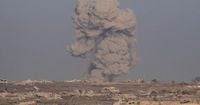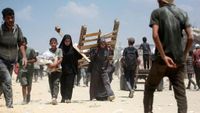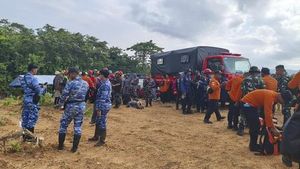On the cusp of September 2025, the world’s attention is once again drawn to the ongoing humanitarian crisis in Gaza, where a devastating shortage of infant formula and basic nutrition has left thousands of children in peril. The crisis, exacerbated by Israeli military restrictions on humanitarian aid, has prompted urgent calls for action from U.S. lawmakers and inspired a new wave of international activism, including a record-breaking flotilla set to launch from Barcelona.
According to Senator Mark Kelly (D-AZ), who has been at the forefront of efforts to address the crisis, at least 85 children have died from hunger-related causes in Gaza since April 2025, and more than 20,000 children have received treatment for malnutrition. "We write to you today with urgency about the grave crisis that infants in Gaza face as a result of severe restrictions on the entry and distribution of humanitarian aid," Kelly and four other Democratic senators wrote in a recent letter to Secretary of State Marco Rubio, as reported by Senator Kelly’s office.
The senators—Kelly, Ruben Gallego (D-AZ), Peter Welch (D-VT), Tim Kaine (D-VA), and Elizabeth Warren (D-MA)—are urging the Trump administration to use its full authority to pressure the Israeli government to allow a massive surge of ready-to-feed infant formula into Gaza. Their plea is grounded in the stark reality that, as famine spreads, many mothers lack the nutrition necessary to breastfeed, making formula the only lifeline for their infants.
"We therefore urge you to demand that the Israeli government immediately facilitate a massive surge of humanitarian aid to enter Gaza, including but not limited to baby formula and medical equipment required to treat infant and child malnourishment," the senators stated in their letter, highlighting the dire nature of the situation.
The roots of the current crisis can be traced back to a near-total blockade on humanitarian aid imposed by the Netanyahu government between March 2 and May 19, 2025. In the aftermath, Israel introduced a new distribution system—the Gaza Humanitarian Foundation (GHF). However, according to Israeli government data cited by Kelly’s office, the GHF has delivered only a fraction of the aid previously managed under the United Nations’ coordination, and crucially, it does not include baby formula. Average daily truck entries remain well below the 500–600 trucks per day that the U.N. considers the minimum needed to meet basic humanitarian requirements.
"We appeal to you not only in your capacity as a government official but as a parent. No child should face the desperation and suffering we are witnessing in Gaza in real time and our hearts break for the children killed in Israel and Gaza," the senators concluded, underscoring the human cost of the crisis. They called on the Trump administration to demand that Israel reopen all crossing points for aid, dramatically increase the volume of humanitarian supplies allowed in, and expand safe access for international organizations to deliver that aid.
Senator Kelly has also been working directly with World Food Program (WFP) Executive Director Cindy McCain to expedite the shipment of millions of Ready-to-Use Therapeutic Food (RUTF) packets currently stockpiled in U.S. warehouses. These high-nutrient packets are designed to treat severe malnutrition and could be a lifeline for Gaza’s most vulnerable children if they can be delivered in time.
The urgency of the situation has not gone unnoticed by international activists. On August 30, 2025, Swedish climate campaigner Greta Thunberg announced that she would join the Global Sumud Flotilla, an independent organization mounting what it describes as the largest solidarity mission in history to deliver humanitarian aid to Gaza. The flotilla—named after the Arabic word for perseverance—will set sail from Barcelona on September 1, with boats from ports around the world converging in a peaceful attempt to open a humanitarian corridor.
“It should not have to be up to us,” Thunberg said in Barcelona, as reported by Free Malaysia Today. “A mission like this should not have to exist. It is the responsibility of countries, of our governments and elected officials to act to try to uphold international law, to prevent war crimes, to prevent genocide. That is their legal duty to do. And they are failing to do so. And thereby betraying Palestinians but also all of humanity.”
The flotilla’s organizers remain tight-lipped about the exact number of boats and the precise timing of their departure, likely out of concern for security. But Brazilian activist Thiago Avila, speaking alongside Thunberg, declared, “This will be the largest solidarity mission in history, with more people and more boats than all previous attempts combined.”
The stakes are high, and the risks are real. Two previous attempts by activists to deliver aid by sea, in June and July 2025, were thwarted by Israeli forces. Troops boarded the vessels, detained the activists, and expelled them after bringing them ashore in Israel. Thunberg herself was among the 12 activists on board the June flotilla, a testament to her ongoing commitment to the Palestinian cause.
The United Nations added to the sense of urgency on August 22 by officially declaring a famine in Gaza, squarely blaming Israel’s “systematic obstruction” of aid for the catastrophe. The Israeli government, for its part, has issued vehement denials, rejecting any responsibility for the unfolding humanitarian disaster.
As the crisis deepens, the political debate in the United States has grown sharper. While Democratic senators press for immediate action and humanitarian intervention, the Trump administration faces mounting pressure to leverage its influence with Israel to secure the flow of life-saving supplies. The administration’s response could have profound implications not only for the people of Gaza but also for America’s standing in the eyes of the world.
Meanwhile, on the ground in Gaza, aid organizations and families are caught in a desperate race against time. With each passing day, the window to prevent further deaths narrows. The challenge of delivering aid is compounded by the ongoing blockade and the limited capacity of the GHF, whose operations fall far short of what’s needed to avert a humanitarian catastrophe.
Internationally, the upcoming Global Sumud Flotilla has become a symbol of both hope and frustration—a grassroots response to what many see as governmental inaction and the failure of the international community to protect the most vulnerable. Thunberg’s participation adds a high-profile voice to the chorus demanding change, while the determination of activists from around the globe underscores the depth of solidarity with Gaza’s civilians.
In the end, the fate of Gaza’s children hangs in the balance. The coming days will test the resolve of governments, the effectiveness of international advocacy, and the power of ordinary people to make a difference. For now, the world watches and waits, hoping that urgent words and courageous actions can overcome the barriers that have left so many innocent lives at risk.





